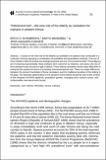| dc.contributor.author | Erick O Nyambedha, Simiyu Wandibba, Jens Aagaard-Hansen | |
| dc.date.accessioned | 2020-07-28T10:18:17Z | |
| dc.date.available | 2020-07-28T10:18:17Z | |
| dc.date.issued | 2003-03-01 | |
| dc.identifier.uri | https://repository.maseno.ac.ke/handle/123456789/1628 | |
| dc.description.abstract | A study on the new role of the elderly as caretakers of orphans was conducted in a rural part of Kenya applying a combination of qualitative and quantitative methods. One out of three children had lost at least one biological parent and one of nine had lost both. These figures are increasing exponentially. Most orphans were cared for by relatives, and about one out of five caretakers was 55 years of age or above. These elderly caretakers faced major difficulties in caring for the orphans in terms of schooling, food and medical care. There is a major difference between the present hardships of these caretakers and the traditional position of the elderly in the past. This dramatic deterioration in the situation of the elderly should be seen in the context of the rampant HIV/AIDS epidemic, population growth, changing socio-cultural values, and unfavourable macroeconomic trends. | en_US |
| dc.publisher | Kluwer Academic Publisher | en_US |
| dc.subject | care, elderly, HIV/AIDS, Kenya, orphans | en_US |
| dc.title | “Retirement lost”—the new role of the elderly as caretakers for orphans in western Kenya | en_US |
| dc.type | Article | en_US |

